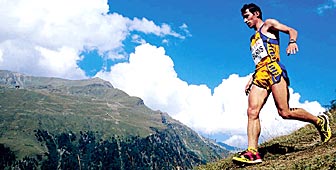Hills alive with the sound of racing

Mountain races throughout Switzerland attract large crowds, but the sheer number of events means not all are big business for organisers.
One of the most famous is the annual race from Sierre to Zinal in canton Valais, which took place at the weekend and is now in its 29th year.
The Sierre-Zinal run is much the same as it was when it began in the 1970s, and the organisers remain as enthusiastic as ever about the event.
“We have a group of volunteers who spend about 7,000 hours preparing the race,” says Jean-Claude Pont, one of the organisers. “We even have to turn away requests from people who want to help us.”
The race is one of the keynote mountain events in Switzerland, but despite its reputation, the number of participants has fallen in recent years.
At the height of its popularity in the 1990s, up to 3,500 people took part in the race.
Pont says the increasing number of competitions is to blame for the fall in numbers.
“There are a lot more mountain races than before, and new sports like mountain biking have also drawn people away from our event,” he says.
Too much choice?
Runners who want to put themselves to the test in mountain races have a much wider selection to choose from than ever before.
This year, even more races have been added to an already crowded events calendar, including the Zermatt marathon, the multi-discipline Gigathlon – organised as part of the special event programme of Switzerland’s national exhibition, Expo.02 – and the Gondo international race.
Claude Defago, organiser of the Tour of the Dents du Midi, says the annual series of mountain endurance tests has become a way for people to channel their stress.
“Rather than travel around the world, people go out and buy a bike or some running shoes, and then take part in local marathons,” Defago told swissinfo.
While some events – like Sierre-Zinal – have been losing ground in recent years, others can’t keep up with demand.
The Glaciers Patrol, staged between the mountain resorts of Zermatt and Verbier, is just one example of how demand far outstrips supply. The last few editions of the race – which combines high-mountain skiing and climbing – have seen organisers turn down applications from hundreds of prospective competitors.
Since 1995, mountain biking’s Grand Raid, which takes place between Verbier and Grimentz, has also had to impose a limit on the number of participants. For its next edition, only 4,000 riders will be allowed to tackle the course.
Deluged with applications
The annual Jungfrau Marathon in September is also regularly deluged with requests from potential competitors. In a bid to cope with the increasing demand, organisers have decided to split this year’s event into two competitions, allowing 7,000 runners to launch their assault on the Bernese Alps.
The marathon’s organisers say the event’s location has much to do with its success. “We are lucky enough to be able to offer people a real marathon in a world-famous region,” says Heinz Schild, the event’s founder. “Half of the participants come from abroad.”
Sponsors have also taken an interest in the marathon’s success. With their help, the budget has soared to nearly SFr1 million ($665,000), while SFr50,000 in prize money is now up for grabs.
The right mix
The Grand Raid has also attracted its share of sponsorship, but organisers say the additional funds are used not so much to increase prize money but to market and publicise the race.
“We send around five letters per year to our competitors,” says Pierre Colson, a member of the organising committee. “We can’t change the route we follow, so we try to promote different aspects of the race.”
Around 60 per cent of the competitors are Swiss, with the remainder coming from 24 different countries.
Race organisers say it takes the right mix of promotional efforts, marketing and sponsoring to attract competitors for the most popular events.
“With such fierce competition between race organisers, only events requiring little infrastructure or ones that are perfectly organised can expect to survive,” Schild told swissinfo.
“Races of only average importance have trouble attracting sponsors, and these days you need more money than ever to carry out the organisation and ensure the security of such events.”
swissinfo/Vanda Janka

In compliance with the JTI standards
More: SWI swissinfo.ch certified by the Journalism Trust Initiative
You can find an overview of ongoing debates with our journalists here . Please join us!
If you want to start a conversation about a topic raised in this article or want to report factual errors, email us at english@swissinfo.ch.